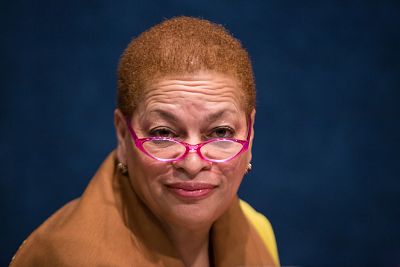Some of the 1,600 women who signed a letter in support of Hill in 1991 want Biden to say more about his role but would support him over Trump.
WASHINGTON — Dr. Julianne Malveaux remembers Oct. 11, 1991 very well — she couldn't tear herself away from the television that day.
She got on the phone to cancel her obligations and spent the day watching as professor Anita Hill testified in front of the Senate Judiciary Committee about the sexual harassment allegations she had leveled against then-Supreme Court nominee Clarence Thomas.
"If you're a black woman and a feminist and you get it," Malveaux said. "It was such a horrible, horrible moment," she recalled. "I watched the hearings and I cried. I remember vividly."
And she was not alone. About a month after the Senate voted to confirm Thomas, Malveaux joined more than 1,600 African-American women in signing a New York Times advertisement titled "African-American Women in Defense of Ourselves."
The ad called Hill's treatment in front of the committee — which was chaired at the time by then-Sen. Joe Biden, D-Del., — both "sexist and racist," saying that Hill was "maligned and castigated for daring to speak publicly of her own experience of sexual abuse."
Now, 28 years later, some women who signed the ad still say they need to hear more from Biden about his role in the 1991 hearing — even as he tries to put the matter behind him in his 2020 presidential bid.
NBC News reached out to some of the women who signed the ad to ask them how they now view the Hill controversy and Biden's presidential run.
Malveaux, an economist and author, said she wants a more direct apology from Biden for his treatment of Hill.
"When you have a 40-year political history, you make mistakes. I get that. I just don't get why he can't simply say — 'Anita, I apologize, Professor Hill, I apologize,'" she told NBC. "To me, apologies have periods. 'I'm sorry,' period."
That's more direct language than Biden has offered so far. OnABC's "The View," he expressed regret for "the way" Hill was "treated," but added "I don't think I treated her badly." On "Good Morning America" days later, he went a little further, saying, "I believed her from the very beginning, but I was chairman. She did not get a fair hearing. She did not get treated well. That's my responsibility."
Margo Jefferson, a professor at the Columbia University School of the Arts and former arts critic for The New York Times, signed the letter. She is also skeptical of Biden's recent apologetic language, referring to his decision to call Hill only shortly before announcing his current presidential candidacy as "tacky."
And, she says, Biden's tone has been too indirect.
"When we're taking responsibility for anything, we use the active voice," Jefferson said. "He was a part of it. He was chairman of the committee. And he can choose to say, 'for myself and on behalf of the committee,' but he does have to take control of his voice amidst this clutter of regrets and reconsiderations and renewed, woke, evaluations."
Others, like teacher and writer Tina McElroy Ansa, are seeking something different than an apology.
"I'd like to hear, not an apology from him, but a discussion of where he was and why he did that and how different he is now," she said.
Ansa says that public statements of regret can often come across as hollow.
"I don't want it to be swept under the rug, I don't want any more apologies," she added.
As the final 2020 Democratic field comes into focus, several of the signers of the 1991 ad say that, while they hope Biden will further address the Hill issue, they would still support him if he becomes the nominee.
And for many, electability trumps every other potential criteria in choosing a candidate.
This is the mindset Malveaux has adopted. "Whoever wins the Democratic nomination, I'm going to work for them. I'm going to do what I can for them," she said. "And if it's Biden, I will, and if it's Bernie [Sanders], I will — I don't want to — but I will."
Similarly, Ansa also expressed support for the eventual Democratic nominee in the hopes of beating President Donald Trump. But she still thinks that Biden's leadership during the Hill hearings "needs to be addressed or else it is a stopping point."
"I totally believe in redemption," she said. "But you've got to work for redemption."
Despite the recent focus on Biden's role in the Hill controversy, the former vice president remains the Democratic front-runner among black women. A recent Morning Consult Poll found that Biden was the first choice of 47 percent of black women, more than twice the share supporting Sanders, his closest competitor.
Still, many of these women's concerns echo what Hill herself told The New York Times after Biden called her late last month — 28 years after the hearings that forced her into the spotlight.
"I cannot be satisfied by simply saying, "I'm sorry for what happened to you,'" Hill told the Times. "I will be satisfied when I know that there is real change and real accountability and real purpose to correct the issues that are still there."
"I'm willing to give him the chance," she added. "And I hope he will step up."
Hill's interview resonated with Jefferson, who thinks it's too early to say which candidate she will eventually support.
"Is he [Biden] public enemy No. 1 to me? No, of course not," she said, "I think Anita Hill put it perfectly, he could become a viable candidate but we'll see. He has a ways to go."
Dr. Psyche Williams-Forson, a professor at the University of Maryland, College Park, says she will think critically about supporting Biden — if he becomes the Democratic nominee — and regardless, it won't change the past.
"I'm going to get behind the best candidate, and so we'll see how all of that plays out," Williams-Forson said.
"But I won't forget."













